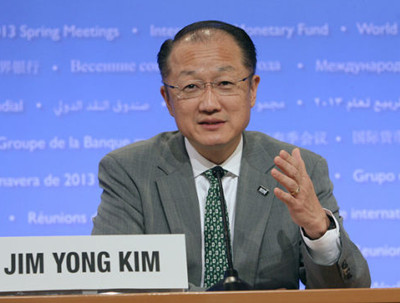Statement at Spring Meetings 2014 Opening Press Conference
在春季會(huì)議開(kāi)幕記者會(huì)上的講話
World Bank Group President Jim Yong Kim
世界銀行行長(zhǎng)金墉
IMF-World Bank Spring Meetings 2014
2014年世界銀行集團(tuán)與國(guó)際貨幣基金組織春季會(huì)議
Washington, DC, United States
華盛頓,美國(guó)
April 10, 2014
2014年4月10日
I would like to welcome you to the 2014 Spring Meetings of the World Bank Group and the IMF. Thank you for coming.
歡迎各位出席2014年世界銀行集團(tuán)與國(guó)際貨幣基金組織春季會(huì)議,感謝各位光臨。
We live in a time of great contrasts, when fewer than 100 people control as much of the world’s wealth as the poorest 3.5 billion combined. But we also live in a time when many developing countries have the strongest growth rates in the world, which each year helps millions of people lift themselves out of extreme poverty.
我們生活在一個(gè)貧富懸殊的世界,世界上不到100個(gè)人控制的財(cái)富相當(dāng)于35億最貧困人口的財(cái)富總和。但是,我們生活的這個(gè)時(shí)代也是一個(gè)許多發(fā)展中國(guó)家保持著世界最高的經(jīng)濟(jì)增長(zhǎng)率和每年幫助大量人口脫貧的時(shí)代。
Our economists estimate that roughly 1 billion people around the world live in extreme poverty today in 2014 – this is down from an estimated 1.2 billion people in 2010. This difficult-to-grasp number is falling steadily and surely, but reaching our twin goals of ending extreme poverty by 2030 and boosting shared prosperity won’t be easy. Developing countries will have to grow at a pace stronger than any time in the past 20 years. To end extreme poverty by 2030, the vast rolls of the poorest – those earning less than $1.25 a day – will have to decrease by 50 million people each year.
據(jù)我們的經(jīng)濟(jì)學(xué)家估計(jì),目前也就是2014年世界上約有10億人生活在極度貧困之中,比2010年估計(jì)的12億人有所減少。這個(gè)難以把握的數(shù)字在穩(wěn)步下降。但是,要想達(dá)到2030年終結(jié)極度貧困和促進(jìn)共享繁榮的兩大目標(biāo)并非易事。發(fā)展中國(guó)家必須以高于過(guò)去20年中任何一年的速度增長(zhǎng)。為了到2030年終結(jié)極度貧困,大量貧困人口,即,每天生活費(fèi)低于1.25美元的貧困人口的人數(shù),必須每年減少5000萬(wàn)。
Think about it. To reach our goal, 1 million people each week will have to lift themselves out of poverty. That’s each week for the next 16 years.
想想吧,要想達(dá)到我們的目標(biāo),每個(gè)星期就得有100萬(wàn)人脫貧,而且是在今后16年里的每個(gè)星期。
And we strongly believe this can happen.
而我們堅(jiān)信這是能夠?qū)崿F(xiàn)的。
Economic growth has been vital for reducing extreme poverty and improving the lives of many poor people. But if this mass migration of people moving from poverty to prosperity is really to gather strength, we need growth that is inclusive creates jobs, and assists the poor directly.
經(jīng)濟(jì)增長(zhǎng)對(duì)于減少極度貧困和改善大量貧困人口的生活始終是十分重要的。但是,如果想要加強(qiáng)這個(gè)人口大量脫貧致富的勢(shì)頭,我們需要使經(jīng)濟(jì)增長(zhǎng)具有包容性、能夠創(chuàng)造就業(yè)和直接救助窮人。
Growth, of course, remains critically important – responsible for three-quarters of the reduction in poverty numbers. So when we look at the global economy today, growth in high-income countries is accelerating and developing countries are growing, though less briskly than before.
當(dāng)然,經(jīng)濟(jì)增長(zhǎng)依然十分重要,對(duì)脫貧人口中的四分之三負(fù)有責(zé)任。所以,我們今天看到在全球經(jīng)濟(jì)中,高收入國(guó)家的經(jīng)濟(jì)增長(zhǎng)正在加速,而發(fā)展中國(guó)家也在增長(zhǎng),盡管速度略低于過(guò)去。

Short term risks to the global economy have eased. Increasingly our worries are focused on the medium-term. Our concern is that the pace of reform could be slowing in this post-crisis period. The focus must return urgently to the structural reform agenda. Even a small setback can result in leaving millions of families in destitution rather than escaping poverty.
全球經(jīng)濟(jì)面臨的短期風(fēng)險(xiǎn)已經(jīng)緩解。我們的擔(dān)憂(yōu)越來(lái)越集中在中期上。我們擔(dān)憂(yōu)的是在這個(gè)危機(jī)后時(shí)期,改革的步伐有可能放慢。我們迫切需要重新聚焦到結(jié)構(gòu)性改革的議程上。即使是微小的倒退都有可能導(dǎo)致億萬(wàn)人繼續(xù)陷于貧困而不是擺脫貧困。
Today we’re releasing a report called “Prosperity for All,” which clearly makes the point that tackling poverty requires understanding where the greatest number of poor live. But it also shows that we must concentrate where hardship is most pervasive. Many smaller countries have far higher shares of their people living below the poverty line. In 16 countries, more than half the population is living in extreme poverty.
今天我們發(fā)布了一份題為《共同繁榮》的報(bào)告,清楚地說(shuō)明了解決貧困問(wèn)題要求我們必須了解絕大多數(shù)貧困人口在哪里。但是報(bào)告也說(shuō)明我們必須把精力集中在貧困最普遍的地方。許多較小國(guó)家的貧困人口比例要高得多。在16個(gè)國(guó)家有一半以上的人口生活在極度貧困之中。
Reducing poverty in these places is as important as making progress in countries where the absolute number of poor people is much bigger. We also must ensure that economic growth in the years ahead is sustainable and takes us off the destructive path of climate change. Climate change could reverse hard-won development gains and could stop our end poverty efforts completely. We can’t end poverty unless we take serious steps to protect our planet.
在這些地方減少貧困和在貧困人口絕對(duì)人數(shù)更高的國(guó)家推進(jìn)減貧同樣重要。我們還必須確保未來(lái)的經(jīng)濟(jì)增長(zhǎng)具有可持續(xù)性,并擺脫氣候變化的毀滅之路。氣候變化有可能使來(lái)之不易的發(fā)展成果毀于一旦,有可能完全阻止我們終結(jié)貧困的努力。如果我們不認(rèn)真采取措施保護(hù)我們的地球,就不可能消除貧困。
In Tokyo, 18 months ago, we promised to become a “solutions bank.” A year ago, in this same room, we announced our goal to end poverty by 2030 and boost shared prosperity. Six months ago, we announced our World Bank Group strategy for our twin goals. To implement this strategy, we needed to become fit for purpose and secure additional finance.
18個(gè)月前,在東京,我們承諾要成為一個(gè)“解決方案銀行”。一年前,就在這間屋里,我們宣布了到2030年終結(jié)貧困和促進(jìn)共享繁榮的目標(biāo)。6個(gè)月前,我們公布了世界銀行集團(tuán)實(shí)現(xiàn)兩大目標(biāo)的戰(zhàn)略。為了實(shí)施這一戰(zhàn)略,我們需要適合目標(biāo)和籌集更多資金。
Starting in July, we will be working differently – we will have global communities of experts in all major areas of development whose work will be aligned to our goals and put us on the path to become a true solutions bank. Our focus will be on providing the best services possible in countries, by keeping a strong presence in country offices and by providing global solutions to local problems.
從今年7月開(kāi)始,我們將以不同的方式工作——我們將會(huì)在所有主要的發(fā)展領(lǐng)域設(shè)有全球性專(zhuān)家團(tuán)隊(duì),他們的工作將與我們的目標(biāo)保持一致,使我們走上成為真正的解決方案銀行之路。我們的焦點(diǎn)將放在為各國(guó)提供最佳服務(wù)上,通過(guò)在國(guó)別辦公室保持強(qiáng)大存在,也通過(guò)提供全球性解決方案來(lái)解決當(dāng)?shù)氐膯?wèn)題。
There is good news on finance as well. Over the next decade, our annual capacity is expected to grow from $45 to $50 billion a year now to more than $70 billion. This is possible thanks to a record IDA replenishment, our costs savings, our financial strength, and clients willing to pay for our knowledge and services.
在財(cái)政方面也有一個(gè)好消息。在今后10年里,我們的年度貸款能力預(yù)計(jì)將從目前的一年450億到500億美元增加到700億美元以上。使之 成為可能要?dú)w功于IDA的創(chuàng)紀(jì)錄增資、我們的節(jié)約開(kāi)支、我們的強(qiáng)大財(cái)力以及客戶(hù)愿意出錢(qián)購(gòu)買(mǎi)我們的知識(shí)和服務(wù)。
We are now more and more fit for purpose. This allows us to make a huge contribution toward the global efforts to end extreme poverty in a generation. I’m optimistic that countries and their partners will take it on, seize this opportunity, and erase this stain from our collective moral conscience once and for all.
我們現(xiàn)在越來(lái)越適合我們的目標(biāo),使得我們能夠?yàn)樵谝淮藭r(shí)間內(nèi)終結(jié)極度貧困的全球努力做出巨大貢獻(xiàn)。我樂(lè)觀地認(rèn)為,世界各國(guó)及其合作伙伴將會(huì)接受這一挑戰(zhàn),抓住這一機(jī)遇,將這一污點(diǎn)從我們的集體道德良心上永久地抹去。
Thank you.
謝謝各位。











